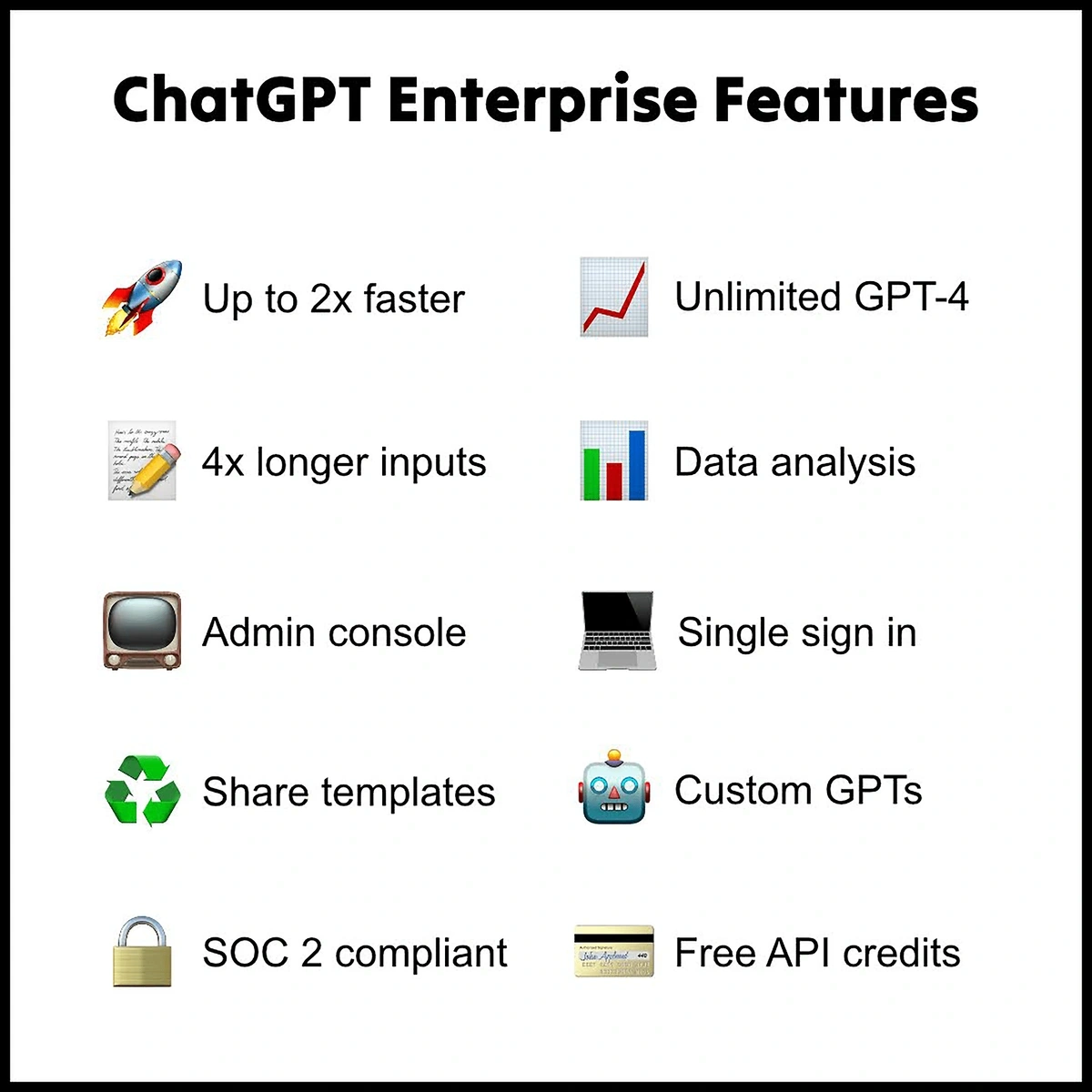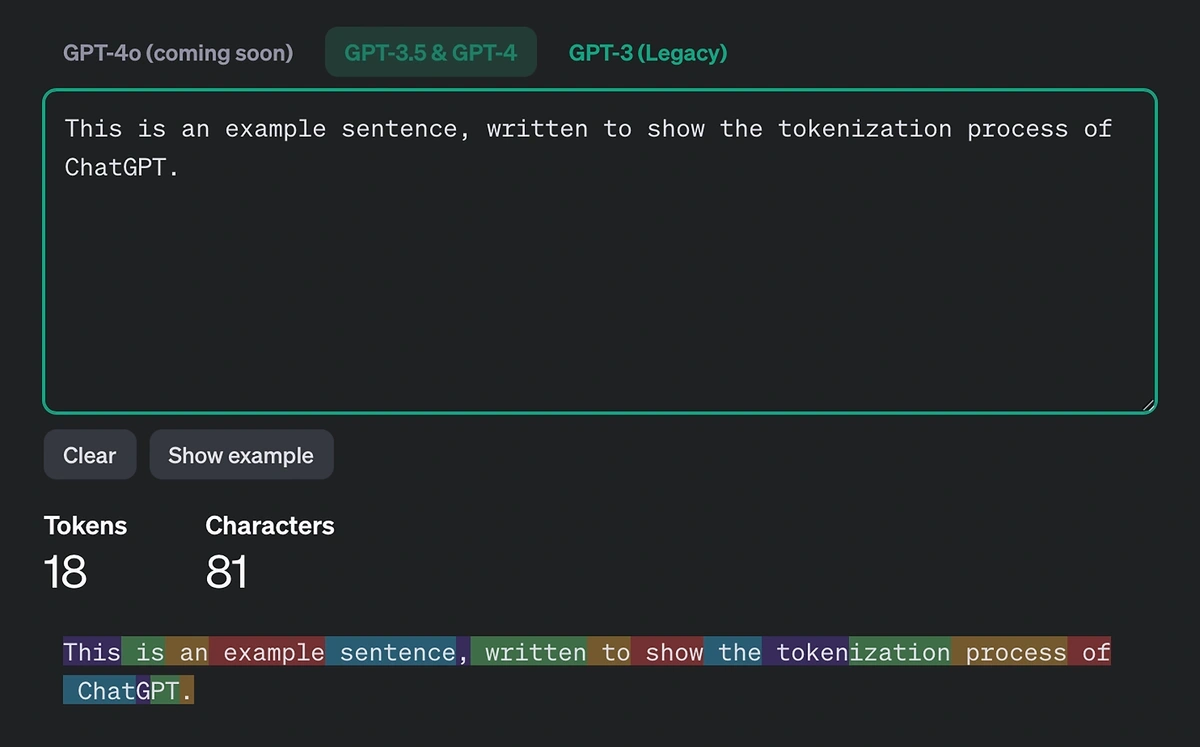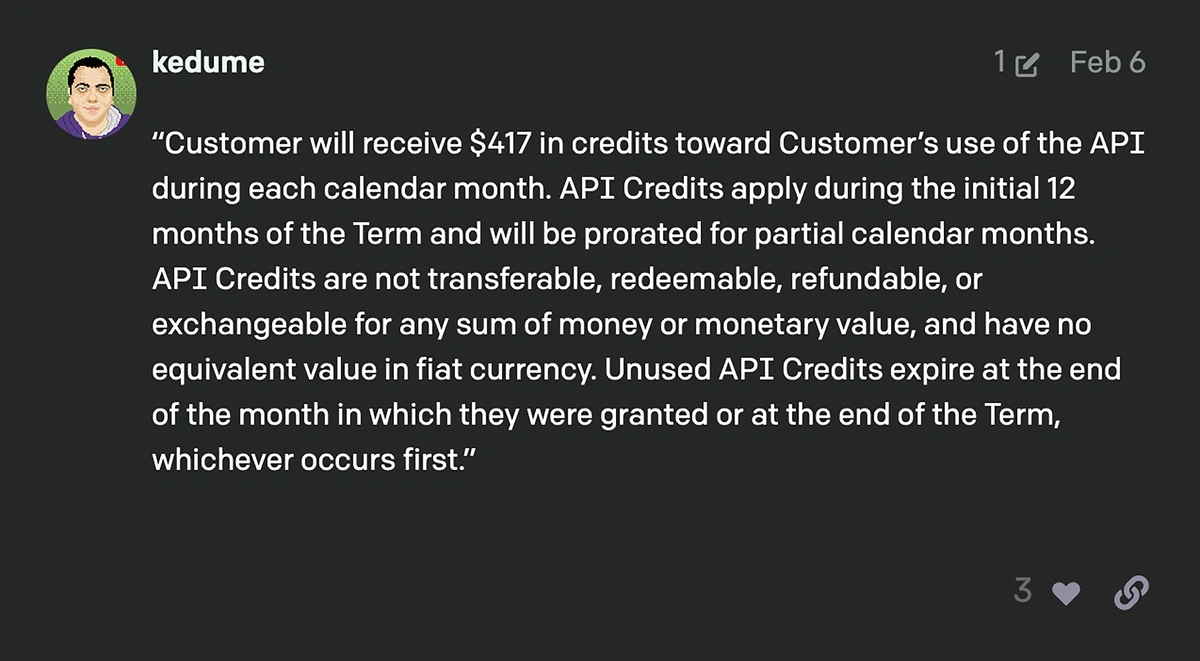Get Advanced Insights on Any Topic
Discover Trends 12+ Months Before Everyone Else
How We Find Trends Before They Take Off
Exploding Topics’ advanced algorithm monitors millions of unstructured data points to spot trends early on.

Keyword Research
Performance Tracking
Competitor Intelligence
Fix Your Site’s SEO Issues in 30 Seconds
Find technical issues blocking search visibility. Get prioritized, actionable fixes in seconds.
Powered by data from
ChatGPT Enterprise Pricing, Features and Limitations
When OpenAI announced the launch of ChatGPT Enterprise, it was hailed as “the most powerful version of ChatGPT yet.”
Early adopters included major firms such as Canva, PwC, and Klarna. Business leaders using ChatGPT Enterprise have sung its praises.
As a solution aimed at large businesses, Enterprise isn’t cheap. But what makes it different to the other versions of ChatGPT available? And do those differences really make the higher price tag worth it?
In this article, we break down how much ChatGPT Enterprise might cost, its features and limitations, and how the tool might evolve in the near future.
How Much is ChatGPT Enterprise?
ChatGPT Enterprise is the only version of ChatGPT that isn’t self-serve. That means it doesn’t have a fixed price.
Instead, potential customers must contact the OpenAI sales team to discuss pricing (which is fairly standard in the world of Enterprise SaaS).
However, there are some clues about how much ChatGPT Enterprise may cost.
When ChatGPT Enterprise was first launched, one Reddit user on the r/ChatGPTPro forum claimed to have reached out to the OpenAI sales team.
They were quoted:
- $60 per user per month
- Minimum contract length of 12 months
- Minimum of 150 seats
OpenAI has not publicly stated whether that 12-month minimum is standard, nor whether $60 per user per month is accurate.
But if the reported pricing is true, here's an estimated cost breakdown for ChatGPT Enterprise:
| Organization size: | 150 employees (minimum) | 200 employees | 2,000 employees | 20,000 employees |
| Price per month: | $9,000 | $12,000 | $120,000 | $1,200,000 |
| Price per year: | $108,000 | $144,000 | $1,440,000 | $14,400,000 |
In short, if this pricing report is accurate, ChatGPT Enterprise comes with a pretty steep price tag. That’s a big “if,” though.
Minimum Price of ChatGPT Enterprise
For context, the tier below ChatGPT Enterprise is called ChatGPT Team. ChatGPT Team is priced at $30 per user per month when billed monthly, or $25 per user per month when billed annually.
It’s reasonable to assume that Enterprise will not be provided at a cheaper cost than Team, as it comes with many more features.
Therefore, it’s unlikely that you will obtain a ChatGPT Enterprise license for less than $30 per user per month.
ChatGPT Enterprise Pricing Compared to Competitors
That price — $30 per seat per month — is roughly what OpenAI’s competitors are charging for their enterprise solutions.
Microsoft’s enterprise AI tool, for example, is currently priced at $30 per user per month. However, business users also need a qualifying subscription to Microsoft 365.
Google’s AI, Gemini, can be added to Google Workspace. Gemini Enterprise is priced at $30 per user per month, when purchased in an annual or fixed-term plan. Again, a Google Workspace subscription is also required.
In May, Anthropic launched the enterprise version of its popular AI tool Claude, called Claude Team. Claude Team is priced at $30 per user per month.
In short, it seems like $30 per user per month is the general going rate for enterprise AI tools as of June 2024.
If ChatGPT Enterprise is really priced at $60 — or even a figure near it — it would be significantly more expensive than any of the competition.
That’s not even considering OpenAI’s relatively stricter minimum user requirement.
What is the Minimum for ChatGPT Enterprise?
ChatGPT Enterprise is currently only available for businesses with at least 150 users.
For comparison, Claude Team has a minimum user requirement of five users. Microsoft Copilot was originally launched with a minimum user requirement of 300, but that has since been removed. Google Workspace Enterprise also has no minimum user requirement.
ChatGPT Enterprise Features
ChatGPT Enterprise’s pricing and user requirements might be a little steeper than those of its competitors, but what exactly do you get for your money?
ChatGPT Enterprise is OpenAI’s most comprehensive offering yet
As you might be able to guess from the name, ChatGPT Enterprise is aimed at large organizations looking to integrate ChatGPT into their workforce.
In OpenAI’s words, Enterprise aims to provide businesses with “an AI assistant for work that helps with any task, is customized for your organization, and that protects your company data.”
Let’s break down these claims.
Unlimited ChatGPT-4
The first — and perhaps most compelling — feature of ChatGPT Enterprise is the lack of usage caps.
All other tiers of ChatGPT have some kind of limit to how frequently users can interact with ChatGPT. In ChatGPT Team, that cap is 100 messages per user per three-hour period. ChatGPT Plus grants users 40 prompts every three hours.
Many users never reach these limits. However, if you’re planning on fully integrating ChatGPT into your business, you might appreciate truly unlimited use of OpenAI’s powerful GPT-4.
If being limited in your usage of ChatGPT is a possibility, and would have significant consequences, it could be better to be safe rather than sorry.
Faster ChatGPT
According to OpenAI, ChatGPT Enterprise runs up to twice as fast as previous versions of ChatGPT.
Users have unlimited access to the most advanced versions of ChatGPT. Enterprise users also get to avoid ChatGPT ads (although that's true of all plans above Go).
According to the head of data systems and integrations at Asana, ChatGPT Enterprise “cut down research time by an average of an hour per day.” Not bad!
Larger Context Window
When ChatGPT Enterprise was released, OpenAI touted its larger context window, which effectively allowed users to process inputs or files up to four times larger than previously.
Since August, however, newer versions of ChatGPT have been released with even larger context windows. ChatGPT-4 and GPT-4o, for instance, have context windows of 128,000 tokens.
In short, ChatGPT Enterprise allows unlimited usage of the versions of ChatGPT with the largest context windows.
OpenAI describes the 128,000-token window as “an average to longer novel.” But what exactly does this all mean?
What is a context window?
A context window is the amount of information that ChatGPT can “remember” at one time. Once you go beyond this limit, the AI might start “forgetting” earlier parts of your conversation. Larger context windows, then, reduce the likelihood of this happening. This allows you to have longer, more complex conversations with ChatGPT. It also allows ChatGPT to process larger, more detailed files.
The context window includes both inputs and outputs. A longer prompt, for example, will eat into the context window.
But a bigger context window is not automatically better. Our expert Osama Tahir explored that in his guide to context engineering.
What are tokens?
Tokens are the individual pieces of information that ChatGPT processes. On average, a token is equivalent to 0.75 words when working in English.
ChatGPT breaks down words into tokens
As you can see in the example, tokens can be a whole word, a part of a word, a single letter, a punctuation mark, and so on.
128,000 tokens, then, would allow you to have a conversation with ChatGPT of up to roughly 96,000 words before you reach the limit. As OpenAI claims, that is indeed on the slightly longer end of the average novel.
Tokens are important to understand for another reason. When using ChatGPT’s API, you are charged per token — or, rather, per million tokens.
Free API tokens
Fortunately, ChatGPT Enterprise provides users with free credits to use the API.
OpenAI didn’t specify how many credits would be provided when it launched ChatGPT Enterprise. Presumably, the precise amount is something to be negotiated with the OpenAI sales team, much the same as the pricing for ChatGPT Enterprise itself.
That being said, one user on the OpenAI forums reported a specific figure. They quoted the response received by an OpenAI customer. This customer was offered $417 in credits per month.
An OpenAI forums user reported this quote for ChatGPT API credits
Well, how much would $417 in credits get you?
How much does ChatGPT’s API cost?
Prices vary depending on what model of ChatGPT you decide to use. Remember, with ChatGPT Enterprise you have unlimited use of GPT-4o, and also of the less advanced — but cheaper — models.
| Model | Context window | Input price (per million tokens) | Output price (per million tokens) | Rough words bought for $417 (assuming equal input/output) |
| GPT-4o | 128,000 | $5 | $15 | 31,275,000 |
| GPT-4 Turbo | 128,000 | $10 | $30 | 15,637,500 |
| GPT-3.5 Turbo | 16,000 | $0.50 | $1.50 | 312,750,000 |
As you can see, that $417 can stretch pretty far. Of course, it’s just one reported figure, and you might be quoted lower.
To understand whether these free credits are worth it, though, you should consider what you might use the ChatGPT API for.
If you want to build your own AI chatbot, for example, $417 might be overkill. In April, AI chatbot developer Mohamed Soufan published some estimates of how much AI chatbots running on ChatGPT might cost different businesses.
He estimated that a customer service AI Chatbot helping 100 customers per month would cost just $0.10 per day.
If you don’t think you’ll be using the API much, the promise of free credits might not be worth the additional price of subscribing to ChatGPT Enterprise. After all, you can purchase credits directly from OpenAI to use the API.
However, if you are going to use the API extensively, then the free credits may well be worth the investment. Additionally, they are a great bonus for users who need ChatGPT Enterprise regardless of API usage.
More Efficient Collaboration
One of the major draws of ChatGPT Enterprise is the way it streamlines collaborative use of ChatGPT. Instead of users having to sign in individually, ChatGPT Enterprise provides them all with a single sign-on.
Administrators can view usage statistics on a central dashboard. This allows you to evaluate how your business is using ChatGPT, and whether it is actually helping you. The dashboard also allows you to manage your workspace, with a variety of controls for team management.
Additionally, ChatGPT Enterprise allows users to share chat templates and even custom GPTs with other users in the same organization. While templates can theoretically be shared over conventional messaging services, being able to do so within ChatGPT itself could save you time.
Increased Security
Another benefit of ChatGPT Enterprise is domain verification. This feature is also included when publishing a custom GPT, and ensures only you can access your ChatGPT tool(s).
Domain verification also helps ensure communications within your organization are kept secure.
ChatGPT Enterprise is SOC 2 compliant, meaning it’s been through and passed an audit. All conversations are encrypted, both in transit and at rest — though that’s also the case in all other tiers of ChatGPT.
OpenAI has faced significant public scrutiny over its handling of private customer data. That’s no doubt why the organization highlighted security when announcing the launch of ChatGPT Enterprise.
On the one hand, OpenAI has an entire portal dedicated to its efforts to ensure and improve security and privacy. It’s trusted by major organizations, such as Morgan Stanley, Stripe, PwC, Moderna, and more.
On the other hand, some of OpenAI’s language reveals more than the company might have intended.
For example, the Enterprise privacy page assures readers that “authorized OpenAI employees will only ever access your conversations for the purposes of resolving incidents, recovering end user conversations with your explicit permission, or where required by applicable law.” That’s all very well, but it does indicate that conversations are accessible by employees. That’s important to remember.
Improved Privacy
One of the major promises made by OpenAI for users of ChatGPT Enterprise is protection from their data being used for training.
Users of ChatGPT Free and Plus cannot prevent OpenAI from using their data to train ChatGPT. However, data from ChatGPT Team, the API, and Enterprise is not used for training.
In theory, that means you can include potentially sensitive business information in your GPT usage without worrying that it will pop up in public versions of ChatGPT.
Users of ChatGPT Enterprise can also decide how long their data is retained.
Integrate Company Data
While ChatGPT Enterprise allows users to keep their company data private, it also allows them to integrate it into ChatGPT. Users can use their data to train custom GPTs.
Advanced Data Analysis
Users of ChatGPT Enterprise have unlimited access to advanced data analysis, which was previously called Code Interpreter.
This powerful tool allows users to upload complex files — for example, a spreadsheet — and ask ChatGPT to analyze them. That might be as simple as asking the AI, “What is interesting about this data?” It might include requests for data visualizations.
ChatGPT Self-Serve Plans vs. Enterprise
What is the Difference Between ChatGPT Enterprise and Plus?
ChatGPT Plus is intended for single users who want to get more out of ChatGPT.
With ChatGPT Plus, you get early access to new features, many more messages with GPT-4o, less restricted usage of the DALL-E image generator, and other benefits compared to ChatGPT Free.
It's perfectly adequate for a wide range of use cases, including ChatGPT for SEO.
However, ChatGPT Plus still comes with limits to usage. It’s intended for individuals, not teams, and its usage limits reflect that.
What is the Difference Between ChatGPT Enterprise and Team?
ChatGPT Team was launched after Enterprise — in January 2024 — and is a middle ground between Plus and Enterprise.
Team has a minimum user requirement of just two.
It’s also self-serve, meaning you can sign up without having to contact the OpenAI sales team. The price is fixed, at $30 per user per month when charged monthly, or $25 per user per month when charged annually.
While ChatGPT Team has many of the same features as Enterprise, it’s not quite as powerful. Users still have limits and can’t decide how long their data is retained. The administrative controls included in ChatGPT Enterprise are more comprehensive, and the level of security is higher.
Finally, and perhaps most importantly, ChatGPT Enterprise users are OpenAI’s top priority when it comes to support and account management.
What is the Difference Between ChatGPT Enterprise and API?
While ChatGPT Free, Plus, Team, and Enterprise are all different levels of the same product — that is, access to ChatGPT — the API is more of an interface intended for developers.
Rather than using the ChatGPT application to interact with the AI tool, developers can integrate the AI directly into their own application or platform. Their app, platform, or software can then directly interact with ChatGPT.
Rather than being charged a monthly (or annual) fee, users of ChatGPT’s APIs must purchase tokens. ChatGPT Enterprise is the only level of ChatGPT that includes credits for API usage. Users of all other levels of ChatGPT must purchase tokens separately.
| ChatGPT Free | ChatGPT Plus | ChatGPT Team | ChatGPT Enterprise | |
| Pricing | Free | $20/month | $25/user/month | Varies |
| GPT-3.5 | Yes | Yes | Yes | Yes |
| GPT-4 | No | Limited | Limited, with higher limit | Unlimited |
| GPT-4o | Limited | Limited, up to 5x more messages | Limited, even higher limit | Unlimited |
| Usage limit | Yes | Yes | Yes | No |
| Minimum users | 1 | 1 | 2 | 150 |
| Custom GPTs | Limited | Create and use | Create and share with workspace | Create and share with workspace, and train on company data |
| Privacy | Data used in training | Data used in training | Team data excluded from training | Team data excluded from training |
How Secure is ChatGPT Enterprise?
ChatGPT Enterprise was touted by OpenAI as having “enterprise-grade security.” It comes with all the security features included in other tiers of ChatGPT, including the encryption of all conversations.
Additionally, ChatGPT Enterprise is SOC 2 compliant. Enterprise data is not used for ChatGPT’s training, and users can determine how long their data is retained. Finally, ChatGPT Enterprise includes domain verification and single sign-on.
How Many People are Using ChatGPT Enterprise?
According to OpenAI, they currently have around 260 Enterprise customers.
However, it's worth noting that those Enterprise accounts have a total of 150,000 seats. Which is a significant number.
Conclusion
ChatGPT Enterprise remains OpenAI’s most comprehensive offering. It’s designed to serve the needs of large organizations, and its price tag will likely reflect that.
That price includes a number of features not available in any other ChatGPT tier, including enhanced security, comprehensive administrative controls, and generous API credits.
However, other tiers — including ChatGPT Team, which is also aimed at organizations — have the benefit of being self-serve, with exact pricing publicly available.
Stop Guessing, Start Growing 🚀
Use real-time topic data to create content that resonates and brings results.
Exploding Topics is owned by Semrush. Our mission is to provide accurate data and expert insights on emerging trends. Unless otherwise noted, this page’s content was written by either an employee or a paid contractor of Semrush Inc.
Share
Newsletter Signup
By clicking “Subscribe” you agree to Semrush Privacy Policy and consent to Semrush using your contact data for newsletter purposes
Written By


Josh is the Co-Founder and CTO of Exploding Topics. Josh has led Exploding Topics product development from the first line of co... Read more







